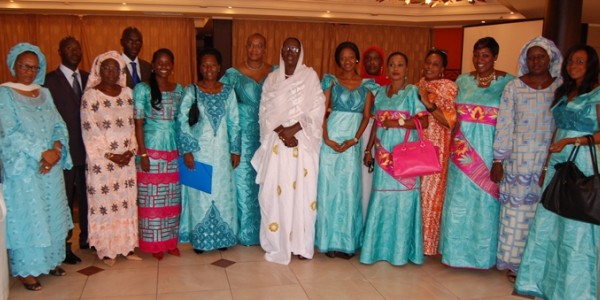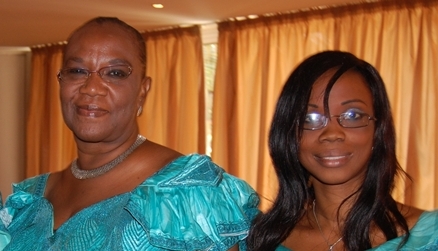
Advance Family Planning (AFP) is pleased to announce that we, along with our Senegalese consultative committee, have selected Réseau Siggil Jigéen (RSJ) as our collaborating partner in Senegal. RSJ is a consortium of organizations devoted to improving and reinforcing the status of Senegalese women in society.
Together with task forces formed around each advocacy priority and in accordance with the Ministry of Health’s National Plan for Family Planning, the new partnership will focus on improving access to contraceptive services and supplies through:
- Policy changes that promote task shifting and implementation of existing policies,
- Increased government resources, and
- Tracking of budget allocations and expenditures for family planning.
“There is a lot of enthusiasm in Senegal around improving reproductive health,” said Fatou Ndiaye Turpin, Program Director for RSJ. “Our partnership with AFP will help channel this enthusiasm into specific advocacy efforts to improve access to quality family planning.”
“RSJ’s well-established relationships among civil society, government, and research groups will prove invaluable to pushing forward AFP’s advocacy efforts in Senegal,” said Modibo Maiga, Regional Director for Futures Group in West Africa and AFP’s West Africa Regional Director.
Advance Family Planning (AFP) is pleased to announce that we, along with our Senegalese consultative committee, have selected Réseau Siggil Jigéen (RSJ) as our collaborating partner in Senegal. RSJ is a consortium of organizations devoted to improving and reinforcing the status of Senegalese women in society.
Together with task forces formed around each advocacy priority and in accordance with the Ministry of Health’s National Plan for Family Planning, the new partnership will focus on improving access to contraceptive services and supplies through:
- Policy changes that promote task shifting and implementation of existing policies,
- Increased government resources, and
- Tracking of budget allocations and expenditures for family planning.
“There is a lot of enthusiasm in Senegal around improving reproductive health,” said Fatou Ndiaye Turpin, Program Director for RSJ. “Our partnership with AFP will help channel this enthusiasm into specific advocacy efforts to improve access to quality family planning.”
“RSJ’s well-established relationships among civil society, government, and research groups will prove invaluable to pushing forward AFP’s advocacy efforts in Senegal,” said Modibo Maiga, Regional Director for Futures Group in West Africa and AFP’s West Africa Regional Director.

Members of the Board, partners and the executive team for Réseau Siggil Jigéen. Photo courtesy of RSJ.
A Growing Commitment to Family Planning
Senegal has made modest gains in family planning over the last several years. Use of modern family planning methods increased from 10% in 2005 to 12% in 2011. Yet despite high levels of knowledge about contraceptive methods, nearly one in three married women in Senegal have an unmet need for family planning, meaning they want to space their next birth or stop childbearing entirely, but are not using contraception.
Senegal has committed to the Ouagadougou Declaration following the “Population, Development, and Family Planning in West Africa: An Urgency for Action” Conference held in Ouagadougou, Burkina Faso, in February 2011. Within the Ouagadougou Partnership, Senegal initiated a framework of “the 3 Ds”—democratize, demedicalize, and decentralize—as an innovative way to structure interventions. This framework has been adopted throughout the region to ensure that family planning interventions are participatory, unencumbered by policy barriers, and effectively managed at the regional, district, and community levels.
At the 2012 London Summit on Family Planning, Minister of Health Honorable Awa Marie Coll-Seck made a strong commitment to family planning. This commitment includes a 200% increase in budgetary support for family planning and announced an ambitious National Plan for Family Planning. Senegal will continue to demonstrate its commitment to introducing innovative approaches to family planning, for example, by hosting the acceptability pilot study of Sayana® Press, a self-injectable contraceptive that is expected to highly facilitate access for women.

Program Director Madame Turpin (left) with RSJ’s Administrative and Financial Officer.
About Réseau Siggil Jigéen
The name Siggil Jigéen carries much significance in Senegalese culture and the Senegalese language, Wolof: it expresses promotion of women’s status in society. ‘Siggil’ means to enhance, rehabilitate, promote and defend ‘Jigéen’, or women, and by extension the family and wider society. ‘Réseau’ means network in French. RSJ’s 17 member organizations address a range of issues that affect women’s lives, including: reproductive health, rights, youth leadership, literacy and training, microfinance, and poverty.
Le Réseau Siggil Jigéen coordonnera les efforts du programme AFP au Sénégal
L'initiative Advance Family Planning (AFP) est heureuse d’annoncer le nom de son nouveau partenaire au Sénégal, le Réseau Siggil Jigéen (RSJ), sélectionné avec le Comité Consultatif Sénégalais d’AFP. RSJ est un consortium d’organisations dédiées à l’amélioration et au renforcement du statut de la femme sénégalaise dans la société.
Avec des groupes de travail organisés autour de chaque priorité de plaidoyer, et en accord avec le Plan National pour la Planification Familiale du Ministère de la Santé, ce nouveau partenariat concentrera ses efforts sur l’amélioration de l’accès aux services et produits de contraception, au travers de:
- Changements politiques promouvant le transfert de tâches et la mise en œuvre de politiques existantes,
- L’augmentation des ressources gouvernementales, et
- Le suivi des allocations et dépenses du budget pour la planification familiale
“Il existe actuellement beaucoup d’enthousiasme au Sénégal autour de la santé reproductive,” a déclaré Fatou Ndiaye Turpin, Directrice de Programmes du RSJ. “Mais il faut focaliser cette énergie sur des objectifs concrets. La démarche ciblée de l’initiative AFP aidera à exploiter cet enthousiasme pour concrétiser des stratégies de plaidoyer spécifiques visant à améliorer l’accès aux services de planification familiale.”
“Les relations bien établies du RSJ avec différents groupes de la société civile, du gouvernement et de la recherche seront précieuses pour faire avancer les efforts de plaidoyer d’AFP au Sénégal,” a déclaré Modibo Maiga, Directeur Régional du Groupe Futures en Afrique de l’Ouest et Directeur Régional d’AFP pour la même région.
Un engagement croissant pour la planification familiale
Le Sénégal a réalisé des gains modestes en planification familiale au cours des dernières années. L’utilisation de méthodes modernes de planification familiale a augmenté de 10% en 2005 à 12% en 2011. Pourtant, en dépit du haut niveau de connaissances sur les méthodes contraceptives, près d’une femme mariée sur trois au Sénégal ont un besoin de planification familiale insatisfait, c’est à dire qu’elles souhaitent espacer leur prochaine grossesse ou ne plus avoir d’enfant mais n’utilisent aucune méthode de contraception.
Le Sénégal a adopté la Déclaration de Ouagadougou lors de la Conférence “Population, Développement et Planification Familiale en Afrique de l’Ouest : Urgence d’agir”, tenue à Ouagadougou, Burkina Faso, en février 2011. Au sein de la coalition de Ouagadougou, le Sénégal a mis en place un cadre de travail appelé “les 3 D”—démocratiser, démédicaliser, décentraliser—afin de structurer les interventions de manière innovante. Ce cadre conceptuel a été adopté au travers de la région afin d’assurer que les interventions de planification familiale soient participatives, libres de barrières politiques et gérées de manière efficace aux échelles régionales, de district et communautaires.
Lors du Sommet de Londres de 2012 sur la Planification Familiale, la Ministre de la Santé Awa Marie Coll-Seck s’est engagée fermement pour la planification familiale. Cet engagement comprend une augmentation de 200% du budget pour la planification familiale, accompagnée de l’annonce du Plan National pour la Planification Familiale. Le Sénégal continuera de démontrer sa détermination à introduire des approches innovantes autour de la planification familiale, en accueillant par exemple l’étude pilote d’acceptabilité du Sayana® Press, un contraceptif auto-injectable qui devrait faciliter l’accès des femmes à la planification familiale.
À propos du Réseau Siggil Jigéen
Le nom Siggil Jigéen a un sens très profond dans la culture et la langue sénégalaise : en wolof, il exprime la promotion du statut de la femme dans la société. ‘Siggil’ signifie rehausser, réhabiliter, promouvoir et défendre ‘Jigéen’, ou la femme, et par extension la famille et la société entière. Les 17 organisations membres du RSJ traitent d’une série de questions affectant la vie des femmes, dont la santé et les droits de la reproduction, le leadership junior, l’alphabétisation, la formation, la microfinance et la pauvreté

